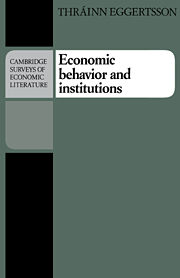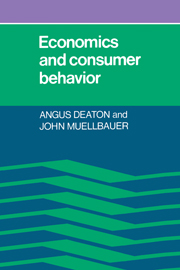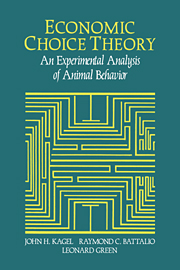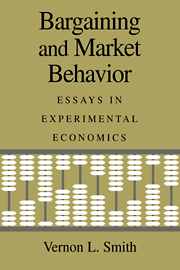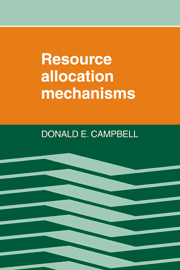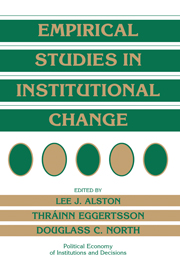Economic Behavior and Institutions
An important research programme has developed in economics that extends neo-classical economic theory in order to examine the effects of institutions on economic behaviour. The body of work emerging from this line of inquiry includes contributions from various branches of economic theory, such as the economics of property rights, the theory of the firm, cliometrics and law and economics. This book is a comprehensive survey of this research programme which the author terms 'neoinstitutional economics'. The author proposes a unified approach to this research, integrating the work of various contributors and emphasising the common principles of inquiry that tie the work together. The theoretical discussion is accompanied by empirical studies dealing with a range of institutions and economic systems. This book will serve as the primary resource for economists and students who want to learn about this important branch of economic theory.
Reviews & endorsements
"The survey succeeds in my view precisely in presenting and linking in a convincing way quite disparate material." Arthur Denzau, Washington University
"This study is much more than an excellent survey of diverse bodies of political and economic literature that falls under the author's rubric of neoinstitutional economics. In the process of integrating and synthesizing this literature Thrainn Eggertsson has made important original extensions and contributions to a burgeoning field of the social sciences." Douglass C. North
"In this delightful book, Thrainn Eggertsson delivers far more than he promises. As the title suggests, he tells us what economists know about institutions and economic performance. He does this well, skillfully guiding the reader from asset specificity to structure induced equilibrium. But he does more than simply report what others have said. The organization of his survey reveals what institutionalists themselves often obscure--the simple, even elegant, logic of their inquiry. He also discusses lucidly how economists can (and how they cannot) help those who are searching for better institutions." Andrew R. Rutten, Journal of Economic Literature
"This book should serve a wide audience. Those who want an introduction to the economic way of thinking about institutions will appreciate its common sense, rigor, and clarity....Those who already know the field, whether friend or foes, will appreciate Eggertsson's fairness, scope, and thoughtfulness. At the very least, they find new perspectives on old and familiar ideas; most will find more. Economists in particular, would benefit from a careful study of the sections on politics. What more can we ask of a survey?" Andrew R. Rutten, Journal of Economic Literature
"This book provides an extremely useful survey of what the author...calls 'neoinstitutional economics'....the book performs an extremely valuable function and can be read with great profit by anyone interested in institutional issues, neoclassical or otherwise." Malcolm Rutherford, Journal of Economic Behavior and Organization
"This book would definitely help many researchers who want to undertake the challenge of ideology and culture. It should prove as well very useful for advanced undergraduates who would like to know about the quiet transformation of economics." Elias L. Khalil, International Review of Economics and Finance
Product details
April 2011Adobe eBook Reader
9780511873102
0 pages
0kg
This ISBN is for an eBook version which is distributed on our behalf by a third party.
Table of Contents
- Part I. Introduction to the Theory:
- 1. Generalising neoclassical economics: new tools and concepts
- 2. Property rights, agency and economic organisation
- 3. Explaining the rules
- Part II. Property Rights and Economic Outcomes:
- 4. The economics of exclusive rights
- 5. The ownership structure of firms and equilibrium outcomes
- Part III. Explaining Economic Organisation:
- 6. The contractual nature of the firm
- 7. The logic of economic organisation
- Part IV. Explaining Property Rights:
- 8. The emergence of property rights
- 9. Property rights in stateless societies
- 10. The state in neoinstitutional economics.

